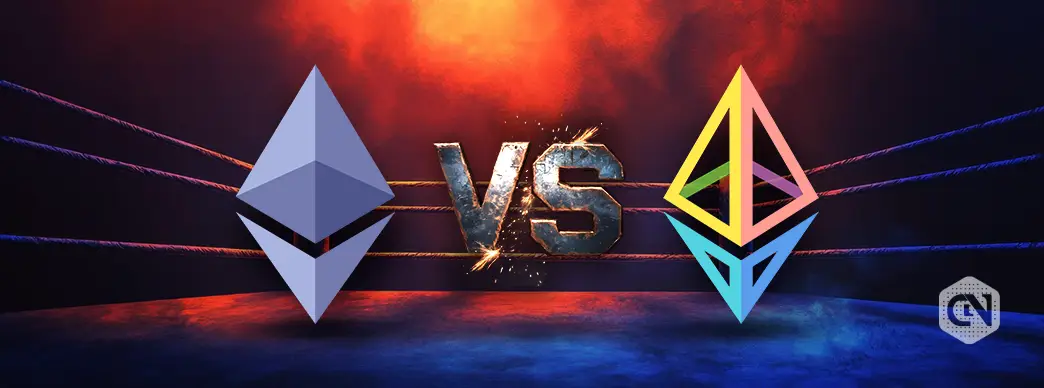Ethereum and ETH are often confused in the fast-evolving blockchain space. While closely related, they serve distinct roles within the same ecosystem. Although closely related terms, they have different meanings within the same ecosystem.
This article clarifies the distinction and what ETH or Ethereum uniquely does in more thorough detail as well. This distinction is highly relevant for anyone who plans to utilize the Ethereum network as an investor, user, or developer.
By the end, you’ll clearly understand how ETH differs from Ethereum — and why this distinction matters for blockchain users, developers, and investors.
What is Ethereum?
Ethereum is an innovative, decentralized, open-source blockchain platform that has caused a great stir in the virtual world, as per Ethereum.org. It is a decentralized global computer network maintained by thousands of participants worldwide, without a central authority.
This decentralized nature means that the system achieves levels of transparency and security that are essentially unattainable with other, more traditional centralized systems.
First proposed in 2013 by Vitalik Buterin of Bitcoin Magazine and developed with funding from an online crowd sale between July and August 2014, Ethereum was created as a platform for building and executing smart contracts.
Buterin envisioned a platform capable of supporting a wide range of applications — from finance to gaming — on a decentralized foundation.. Since its inception, Ethereum has become one of the truly major crypto projects.
What is Ether?
Ether (ETH) and Ethereum are often used interchangeably, but they represent two different aspects of the same ecosystem.
In this article, we hope to clarify the differences between these two terms, which are critical for anyone interacting with the Ethereum network. Understanding this difference will help investors, developers, and users make informed decisions in blockchain.
Ether is the name for Ethereum’s native coin/token, typically abbreviated to ETH. It is the backbone of the Ethereum ecosystem, fueling transactions and smart contract executions.
Part of a security deposit securing the network, an end-user paying a transaction fee (gas) in ETH attracts network participants to validate transactions. Ether is a widely traded cryptocurrency available on most exchanges, used for transactions, network fees, and investment
Key Differences Between ETH and Ethereum
Ethereum: The protocol allows the building of smart contracts and dApps. It wants to democratize the internet by giving control back to end users and reducing the role of an intermediary.
ETH: ETH is a cryptocurrency that gives holders access to the Ethereum network and allows them to use ETH in the same way they would any other digital asset — as money that can be bought, sold, and traded on crypto exchanges.
The difference between ETH vs. Ethereum is that both serve entirely different purposes. Ethereum aims to provide a solid infrastructure for decentralized applications, while ETH is the lubricant that fuels all operations inside this ecosystem and motivates network participation. While ETH is a tradable cryptocurrency, Ethereum itself is not an asset but a network. However, Ethereum’s adoption and development directly influence ETH’s value.
Similarities Between ETH and Ethereum
ETH and Ethereum are inherently decentralized and do not have central control as an entire network of computers spanning the globe backs them. It boosts security and censorship resistance through decentralization. Both operate on the blockchain, but Ethereum’s blockchain underpins the platform to record all transactions and smart contract interactions transparently and immutably.
Both Ethereum and ETH are tied to smart contracts. Ethereum provides the platform for creating and running these agreements, while ETH is the currency used to pay for executing them. When considering the Ethereum cryptocurrency vs. ETH, it’s important to note that ETH and Ethereum share the core property of innovation and are unstoppable.
Importance of Understanding the Distinction
Investors must understand the difference between ETH and Ethereum to make wise decisions. Purchasing ETH is not the same as investing in the Ethereum platform. You are investing in a currency created to be used on this platform, better described as a token.
To put it simply, Ether’s price is determined by a mixture of various factors: the adoption and success of Ethereum, market sentiment, and its incoming regulations from governments surrounding cryptocurrencies. Factors influencing ETH’s value include Ethereum’s adoption, overall market sentiment, and evolving global crypto regulations.
Understanding this distinction is critical for developers building atop Ethereum, especially when trying to use an Ethereum and ETH comparison when presenting what they are doing. They will have to understand how to do things with ETH in their apps, how they deal with gas fees, and on top of that, start to think about the economics of Ethereum, since it will often influence how they build their projects. That is critical to create apps with high-impact outcomes and get to participate in more of the many things that are going on in the overall Ethereum ecosystem.
Conclusion
Technically, ETH and Ethereum are two very different things, but this is vital to grasp in the fast-moving world of blockchain and cryptocurrency. Ethereum is an innovative blockchain platform that provides new opportunities for creating decentralized applications and services that could, in principle, change many aspects of our digital existence. As the native currency, ETH fuels transactions on this platform and motivates network participation while functioning as a value store.
If the Ethereum ecosystem blossoms and becomes more expansive and layered in nature, the two concepts could have a new kind of relationship. Staying aware of these distinctions is essential for anyone engaging with Ethereum, as both ETH and the network continue to evolve together.
See less
